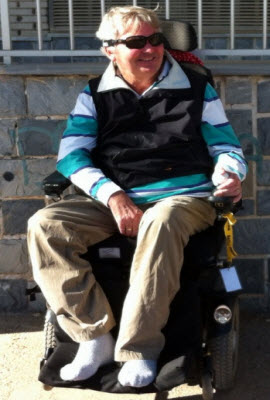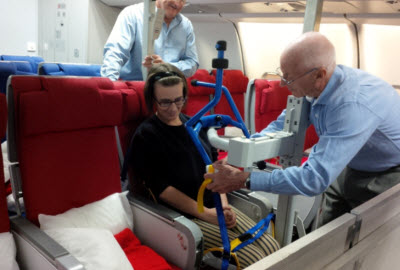Retired Police Officer hits out at airports manual handling of disabled people
- Written by Roberto Castiglioni
 A retired Chief Superintendent of police wrote a letter to Lord Cotter voicing his disgust with the way airports help passengers with severe reduced mobility.
A retired Chief Superintendent of police wrote a letter to Lord Cotter voicing his disgust with the way airports help passengers with severe reduced mobility.
“I have MS and I am confined to a wheelchair,” Anthony Jones said in his letter to Lord Cotter. ”I am 70 years of age and a retired Chief Superintendent of police. I am a frequent flyer, and expect to be treated with respect when travelling, but find that the procedure used to handle people with reduced mobility is antiquated and demeaning.”
In his letter to Lord Cotter Mr Jones says that there is an urgent need to revisit national guidelines in line with EU and International legislation. “I would be grateful if you could use your offices to bring my experiences to the attention of government ministers with responsibility,” he wrote.
Lord Cotter has already made contact, promising to act on the problem of manual handling which he believes to be a matter of national interest.
Mr Jones’ letter follows an incident he had on the 15th of November returning to Bristol from a short holiday in Spain.
Anthony said he had to wait twenty minutes for airport helpers to arrive on the plane. "Who the hell put you in that bloody seat, two of our drivers are off with bad backs and I will join them tomorrow after this," one of the helpers told the retired police officer.
of our drivers are off with bad backs and I will join them tomorrow after this," one of the helpers told the retired police officer.
“They both struggled to lift me from the aircraft seat and to place me into the aisle chair, my upper clothing was pulled up above my chest and the whole experience was uncomfortable and traumatic,” he said. “My wife and I are very disappointed since we had taken the trouble to meet with airport management to talk about last year’s similar incident but the situation has not improved at all.”
“We take all complaints seriously and each complaint is investigated and responded to,” a spokesperson for Bristol airport told Reduced Mobility Rights. “We met Mr Jones previously regarding his experiences at Bristol Airport and we apologise for any distress caused during his recent visit. “
The spokesperson added that in the month of September 2014 airport services assisted over 8,400 disabled passengers and the majority of feedback received was positive.
Manual handling to help disabled passenger enplane or deplane is legal under European rule. However, Lord Cotter’s efforts to ban it could very well succeed.
Norway is not a member of the European Union, but complies with EU laws and regulations. In July 2013 the country changed its access to air travel rule.
 Among the most significant changes, Norway introduced a ban on manual handling. The new rule states airports must use ramps, high loaders and mechanical hoists to help passengers with reduced mobility board and deplane.
Among the most significant changes, Norway introduced a ban on manual handling. The new rule states airports must use ramps, high loaders and mechanical hoists to help passengers with reduced mobility board and deplane.
Las October, the UK Court of Appeal upheld a county court decision to award compensation to a disabled woman because Thomas Cook Tour didn’t act “with common humanity.”
Dismissing the appeal, Lord Justice Vos said there is ''nothing to stop the UK legislating for additional duties not covered by the [EU] Regulation''.
Solutions like medical grade hoists are used at airports across the world. Products like the Eagle hoist improve and dignify the boarding and deplaning process of people with disabilities while meeting Health and Safety rules for staff and members of the public.










